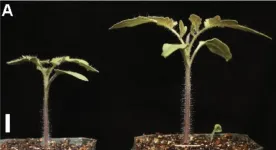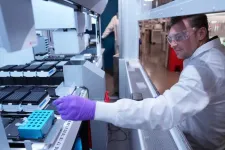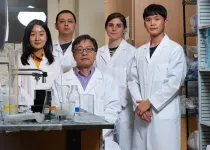(Press-News.org) During his presidency, Donald Trump and members of his administration repeatedly accused federal civil servants of undermining their agenda through the “deep state.” They sought to curtail career employees’ workplace protections, sought to severely cut some agencies’ funding, and in some cases attempted to undermine or alter agency missions.
Hamilton College Associate Professor of Sociology Jaime Kucinskas and Yvonne Zylan, an independent scholar, published the peer-reviewed “Walking the Moral Tightrope: Federal Civil Servants’ Loyalties, Caution, and Resistance under the Trump Administration” in the American Journal of Sociology in June. The authors addressed the question, “How did mid- and high-level career civil servants across agencies experience and respond to the Trump administration? Were the career corps as loyal to mission, risk averse, and serially partisan or nonpartisan as most public administration research instead describes?”
Kucinskas and Zylan’s findings raise concerns about the vulnerability of the United States government to further democratic backsliding and deterioration under a future more competent autocratic leader.
Based on 127 interviews with employed and former mid- and high-level career civil servants during the first three years of the Trump administration, the authors found that, despite widespread dissatisfaction with the Trump administration, most civil servants largely sought to comply at work, circumscribed by their loyalties to acting appropriately within the scope of their mandates. This was despite the fact that respondents reported again and again of a uniquely toxic, unpredictable, and fear-based political leadership class—one that rendered long-standing norms of bureaucratic service unstable guides to action. The employees tread a kind of moral and ethical tightrope stretched perilously between two poles, toeing the line on the one hand and “guerillas” resisting within a “deep state” on the other.
Kucinskas and Zylan found that a range of intuitive, habitual, and conscious, deliberative moral and ethical calculations characterized the respondents’ actions and their interpretations of what they were doing. Under repressive leadership, there was less room for use of institutional voice, and incentives to exit increased.
Few if any of their respondents exhibited extreme behavior. Instead, they searched for ways to uphold multiple, often competing, professional, institutional, and ethical commitments while avoiding violations of the Hatch act or putting themselves at risk of political retribution. They worried about acting in complicity with an increasingly repressive regime, but seemed to worry more about violating professional and institutional norms of loyalty to agency, mission, and government,
Under these conditions, the options for safely expressing opposition dramatically narrowed. Previously sanctioned forms of voice, including institutionalized grievance and dissent mechanisms, became politicized and personalized, making them riskier and less compatible with civil service norms of loyalty and non-partisanship.
Most of the authors’ informants expressed alarm at the potential for harm to the federal government and the public posed by the new administration.
Over time, these concerns led many career civil servants to engage in a diverse set of practices, some of which may reasonably be characterized as forms of resistance, though few of our respondents described them as such. Instead, career civil servants tended to frame their actions neither as resistance nor acquiescence, but as variations of acceptable bureaucratic adaptation to changes in political leadership, staying largely within the lines set by the new administration and satisfying norms of institutional and agency loyalty.
Those who felt support from supervisors or colleagues were more likely to express dissent or subtly undermine or delay initiatives. Yet supervisors (especially in contentious agencies) were generally reticent to support dissent, even as they expressed frustration and fear about the direction of their agencies.
No one understanding of “compliance” or “resistance” guided action. Even among the mid- and high-ranking career bureaucrats the authors interviewed, the influence of immediate colleagues and superiors was critical. They largely reinforced a risk-averse professional culture, but they also served as reference groups that might ratify resistant conduct where it arose.
The researchers also observed an expressed intention to leave their agencies. By the end of their study, one-fifth of the employees they had interviewed initially had left the federal government.
As the new administration adopted increasingly repressive political tactics over time, it fundamentally altered the sense of what was morally right and wrong in structuring civil servants’ pragmatic, moral, and ethical assessments. This gave rise to some striking cracks in the coherence of the accounts expressed by even the most seasoned civil servants working in the most affected locations. In interviews, they described failing to understand what was taking place, experiencing cognitive dissonance, and feeling deeply unsure of themselves and their environments.
The two authors completed three waves of semi-structured, in-depth interviews to track respondents’ experiences over the course of the presidential term. They spoke with civil servants during the beginning, middle, and end of the administration (March–August, 2017, June–November 2018, and December 2019–March 2020, respectively).
For the second wave, they tried to conduct follow-up interviews with all civil servants from the first round who were still working for the federal government and spoke with 30 additional people. They conducted 19 follow-up interviews and interviewed two new informants in the third wave from the end of 2019 just prior to President Trump’s impeachment trial in the Senate through mid-March, as the coronavirus pandemic shutdowns were beginning.
For their third wave of interviews, they contacted those working with high-level appointees and people likely to experience change, as those experiencing “significant change . . . are more likely to notice the events and experiences that pushed or pulled them ‘off course.’”
Their respondents worked in nearly all federal executive branch agencies—several of which were subject to considerable proposed budget cuts such, as the Environmental Protection Agency (EPA) and the United States Agency for International Development (USAID). The largest group of civil servant interviews were in the EPA, the Department of Health and Human Services (HHS), the Department of Justice (DOJ), and the Department of State (DoS), as they were seeking to oversample in the most contentious and highest-ranking positions.
END
Walking the moral tightrope:
Federal civil servants’ loyalties, caution, and resistance under the Trump administration
2023-07-18
ELSE PRESS RELEASES FROM THIS DATE:
Ethylene boosts plant yield and vigor
2023-07-18
Exposing seedlings to ethylene in darkness increases size and vigor, in a finding with implications for agriculture. Farmers have worked to increase crop yields for millennia, and the quest remains urgent as the human population continues to grow. Increases in yield often come at a price, however: reductions in stress tolerance. Brad Binder and colleagues sought to increase plant yield without sacrificing hardiness by using to the gaseous plant growth hormone ethylene. Previous work established that seedlings grown in the dark and treated with ethylene show reduced growth and a distinctive hooked shape. However, the authors found that ...
Each mom passes unique set of breast milk antibodies to baby
2023-07-18
Breast milk from each individual contains a unique assemblage of antibodies that are surprisingly stable throughout lactation and across pregnancies, according to a new Journal of Experimental Medicine study from the University of Pittsburgh School of Medicine.
As a baby’s early immunity is directed by antibodies from breast milk, the new research provides insight into why protection against different infections varies among infants and why some develop a life-threatening gut disease called necrotizing enterocolitis (NEC).
“While each milk donor in our study had very different antibody profiles from one another, we ...
Life on Earth didn’t arise as described in textbooks
2023-07-18
Life on Earth didn’t arise as described in textbooks
No, oxygen didn’t catalyze the swift blossoming of Earth’s first multicellular organisms. The result defies a 70-year-old assumption about what caused an explosion of oceanic fauna hundreds of millions of years ago.
Between 685 and 800 million years ago, multicellular organisms began to appear in all of Earth's oceans during what's known as the Avalon explosion, a forerunner era of the more famed Cambrian explosion. During this era, sea sponges and other bizarre multicellular organisms replaced small single-celled ...
This is what relatives think about home-based hospital care
2023-07-18
Relatives are a great resource in today's healthcare system. In Norway, relatives' efforts add up to approximately the same number of person-years as provided by the public municipal health and care services.
But the role of relatives is changing. Changes in the age composition of the population, changed social structures and family patterns will affect how many relatives each of us has to support us in the future.
In order to look after relatives in the best possible way, it is necessary to have increased knowledge about relatives' involvement and the need for support in various ...
Howard and Susan Elias make $16.25 million gift to fund cancer neuroscience research at MD Anderson
2023-07-18
HOUSTON ― The University of Texas MD Anderson Cancer Center today announced a
$16.25 million gift from Howard and Susan Elias to accelerate brain tumor and cancer neuroscience research, an emerging field focused on integrating the role of the nervous system in cancer. Howard Elias’ son, Harrison, was diagnosed with brain cancer and underwent successful surgery in 2000. Six years earlier, Howard’s father had died of glioblastoma. These separate diagnoses sparked a giving program over the years, leading to this latest gift which represents ...
Allen Institute for Immunology partners with Lilly to better understand autoimmune disease
2023-07-18
SEATTLE — July 18, 2023 — In a significant milestone for the Allen Institute for Immunology, a division of the Allen Institute, researchers and staff will collaborate with private industry researchers to aid in the detailed molecular understanding of disease, in service of developing new treatments and therapies to improve human health.
Specifically, Allen Institute scientists will work with researchers from Eli Lilly and Company (Lilly) to investigate and profile disease state diversity and biomarkers for drug response involving atopic dermatitis (eczema) and rheumatoid arthritis using Allen Institute-developed ...
Using AI to speed up vaccine development against Disease X
2023-07-18
CEPI, the Coalition for Epidemic Preparedness Innovations, and the Houston Methodist Research Institute (HMRI), have today announced a partnership to combine cutting-edge artificial intelligence (AI) technology with established laboratory techniques to speed up development of future vaccines against novel viral threats (also known as Disease X). HMRI will lead a consortium including experts from Argonne National Laboratory (University of Chicago), J Craig Venter Research Institute, La Jolla Institute, The University of Texas Medical Branch, and The University of Texas, ...
Japanese beetles could spread throughout Washington state in 20 years
2023-07-18
PULLMAN, Wash. – Without intervention, the colorful but devastating Japanese beetle could make its way across the evergreen state within two decades, according to a study of their potential dispersion.
The iridescent, green-and-copper beetles damage plants by “skeletonizing” their leaves, chewing up all the soft green parts between the veins. They eat over 300 plants and pose a serious threat to Washington agriculture as some of their favorite crops include grapes, hops and cherries.
Once established, Japanese beetles are tough to eradicate, but it may be possible to keep them under control, said David Crowder, a Washington State University entomologist.
“These ...
Will artificial intelligence (AI) end civilization? Lero researchers seek public's views on AI and software
2023-07-18
Will artificial intelligence (AI) end civilisation? Researchers at Lero, the Science Foundation Ireland Research Centre for Software and University College Cork, are seeking help determining what the public believes and knows about AI and software more generally.
Psychologist Dr Sarah Robinson, a senior postdoctoral researcher with Lero, is asking members of the public to take part in a ten-minute anonymised online survey to establish what peoples’ hopes and fears are for AI and software in general.
“As the experts debate, little attention is given to what the public thinks – and the debate is raging. Some ...
NIH grant backs Rice U. lab’s sickle cell disease research
2023-07-18
HOUSTON – (July 18, 2023) – Rice University bioengineer Gang Bao and his team have won a 4-year, $2.6 million grant from the National Institutes of Health to address critical questions surrounding the safety and efficacy of using gene editing to treat sickle cell disease.
Because it is caused by a mutation in a single gene, sickle cell disease is a prime candidate for gene editing treatments using tools such as CRISPR-Cas9.
“Sickle cell disease affects over five million people worldwide, and ...
LAST 30 PRESS RELEASES:
ASU researchers to lead AAAS panel on water insecurity in the United States
ASU professor Anne Stone to present at AAAS Conference in Phoenix on ancient origins of modern disease
Proposals for exploring viruses and skin as the next experimental quantum frontiers share US$30,000 science award
ASU researchers showcase scalable tech solutions for older adults living alone with cognitive decline at AAAS 2026
Scientists identify smooth regional trends in fruit fly survival strategies
Antipathy toward snakes? Your parents likely talked you into that at an early age
Sylvester Cancer Tip Sheet for Feb. 2026
Online exposure to medical misinformation concentrated among older adults
Telehealth improves access to genetic services for adult survivors of childhood cancers
Outdated mortality benchmarks risk missing early signs of famine and delay recognizing mass starvation
Newly discovered bacterium converts carbon dioxide into chemicals using electricity
Flipping and reversing mini-proteins could improve disease treatment
Scientists reveal major hidden source of atmospheric nitrogen pollution in fragile lake basin
Biochar emerges as a powerful tool for soil carbon neutrality and climate mitigation
Tiny cell messengers show big promise for safer protein and gene delivery
AMS releases statement regarding the decision to rescind EPA’s 2009 Endangerment Finding
Parents’ alcohol and drug use influences their children’s consumption, research shows
Modular assembly of chiral nitrogen-bridged rings achieved by palladium-catalyzed diastereoselective and enantioselective cascade cyclization reactions
Promoting civic engagement
AMS Science Preview: Hurricane slowdown, school snow days
Deforestation in the Amazon raises the surface temperature by 3 °C during the dry season
Model more accurately maps the impact of frost on corn crops
How did humans develop sharp vision? Lab-grown retinas show likely answer
Sour grapes? Taste, experience of sour foods depends on individual consumer
At AAAS, professor Krystal Tsosie argues the future of science must be Indigenous-led
From the lab to the living room: Decoding Parkinson’s patients movements in the real world
Research advances in porous materials, as highlighted in the 2025 Nobel Prize in Chemistry
Sally C. Morton, executive vice president of ASU Knowledge Enterprise, presents a bold and practical framework for moving research from discovery to real-world impact
Biochemical parameters in patients with diabetic nephropathy versus individuals with diabetes alone, non-diabetic nephropathy, and healthy controls
Muscular strength and mortality in women ages 63 to 99
[Press-News.org] Walking the moral tightrope:Federal civil servants’ loyalties, caution, and resistance under the Trump administration





